Film Festival Secrets Podcast #35: It's a Trap! "Festival rights" & the music in your film.
"Birth of a Nation" breaks sales records for Sundance and festivals worldwide
From the Hollywood Reporter: The Sundance audience gave the slave-rebellion drama an extended standing ovation, which was followed by mostly enthusiastic reviews. By the next morning, Fox Searchlight had plunked down a jaw-dropping $17.5 million for worldwide rights to the film, the biggest sale in the fest’s history. It also marks the largest sum ever paid for a finished movie at any festival, including Cannes, Berlin and Toronto.
Sesame Street's New Home: HBO
Film Festival Secrets Podcast Episode #22: Emily Best, founder of Seed & Spark
Since meeting filmmaker and startup founder Emily Best in November, I’ve wanted to get her on the podcast to talk about her company Seed and Spark. This fundraising tool reimagines crowdfunding from the perspective of an indie filmmaker and takes the experience way past fundraising into audience building and distribution.
Sundance by the Numbers: An Infographic of the 2014 Festival
With the 2015 Sundance Film Festival just a few months away, I felt like taking a look back at the 2014 event – in particular this "by the numbers" infographic published by Cultural Weekly. Unlike most crappy infographics which are just articles tortured into vaguely graphical presentation, this one mostly makes good visual use of the data by comparing the last few years of the Festival against one another.
How Do You Know When it’s Time to Stop Submitting Your Film to Festivals?
Heidi Burkey, director of documentary feature Makin' Wookiee, asks: How do you know when to stop submitting to festivals?
What "Stripped" teaches us about the future of self-distribution and the marketing power of "Calvin & Hobbes."
This is the future of film distribution that "the industry" has anticipated in increasing degrees over the last decade: filmmakers creating quality content, cultivating an audience, and selling directly to that audience with as few middlemen as possible. The tools for this distribution model have been sneaking up on us but they finally seem ready for prime time. More importantly, there finally exists a critical mass customers who have the technology to watch movies this way -- and they seem perfectly fine "owning" just a digital file.
Time to add IndieFlix to the mix?
Recently I saw some smart messaging from IndieFlix. This 30 second spot acknowledges that Netflix is the reigning king of streaming entertainment on the mass media side, but it encourages movie lovers to expand their range of options to include indie films on the IndieFlix platform.
Streaming video revenue could eclipse US box office within the next 3 years
Rich McCormick writes a piece for The Verge about a new report from PricewaterhouseCoopers that predicts that streaming video services will make up 43% of the American film industry. Read on to learn where the revenue growth is coming from (spoiler: it isn't at the expense of movie theaters).
YouTube Is Ready for Its Close-Up
Veronica Mars digital download fiasco a depressing finish to a Kickstarter miracle
By now you've probably heard about the nasty fallout of the delivery of digital downloads to Veronica Mars backers: the disappointed fans and the offers of refunds to backers who ended up buying copies of the film from Amazon and iTunes. It speaks a lot to how much services like iTunes have become the default entertainment ecosystems and the fact that, if you want to try to buck that trend with a Veronica Mars-shaped Trojan horse, the execution had better be flawless.
The best collection of film distribution advice you're likely ever to see in one place
Thom Powers, who programs documentary films for more film festivals than is probably good for him, gathered the latest in doc distribution wisdom from a wide range of filmmakers. A must-read.
My favorite tidbit:
ALEX GIBNEY (DIRECTOR, WE STEAL SECRETS: THE STORY OF WIKILEAKS): Ask every dumb question you can think of. The dumb questions are always the best ones because they tend to provoke the clearest answers. Don’t ever pretend to know more than you do. That is the best way to get conned.
Film Festival Secrets Podcast #12 - 3 Questions To Ask Yourself As You Contemplate Your Film's Distribution
Episode #12, featuring Sheri Candler, Director of Digital Marketing Strategy for The Film Collaborative. Sheri shares the three questions that filmmakers should be asking themselves about their films – and usually don't – as they begin to contemplate that picture's distribution.
12 Steps to a Saner Festival Game Plan
Why it Took 7 Years for U.S. Audiences to See Horror Movie 'Mandy Lane'
Digital Tape is Dead: Bidding “Adieu” to the HDCAM (and its cousins)
Gasland's Josh Fox on "Here's the Thing"
Toward Transparent Festival Economics
Heather Croall, writing for Indiewire:
Filmmakers deserve more money for their hard work on making their films. It’s time to look at who’s really benefiting from, and piggybacking on, their success. Analyze the budgets – are there any people in the budget earning fees for hard-to-define roles? Is all film funding going directly to the filmmakers? If not, where is it getting stuck along the way? Analyze the contracts - who gets what in the back end, so to speak?
Where would the money come from?
Tom Hall from the Sarasota Film Festival, responding on Indiewire to a recent article by Sean Farnel which promoted the idea that festivals should share ticketing revenue with filmmakers:
...a reality check seems in order; in almost all cases, there is no profit to share and the loss of revenue from ticketing would create another economic disadvantage in an already difficult environment. That said, festivals must work with filmmakers to help create real value for their films, value that capitalizes on the rapidly changing marketplace without repeating the failed models of the past.
I didn't link to Farnel's original piece because, frankly, it is an argument which surfaces all the time. "Festivals spend all that money on plane tickets and parties," goes the thinking, "so why can't they kick some of that ticketing revenue back to the filmmakers?" I've written rebuttals before (here's one from 2008), but the bottom line is, as Hall points out, that there is very little revenue to share. (Never mind that the accounting would be nightmarish.)
I like Hall's attempt to shift the focus from potential monetary compensation to the value that festivals should bring to filmmakers and their films in other ways. Hopefully we can put this idea to rest for another few months.


















